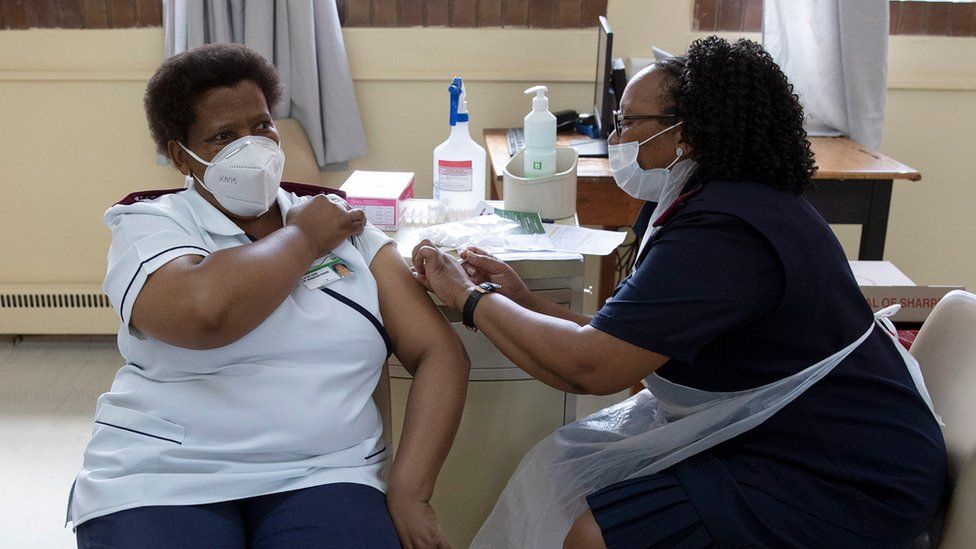Prof Calum Semple says some scientists are “hugely overstating” the fears around the Omicron variant.

Image source, AFP
The Omicron Covid variant is “not a disaster” and some people may be “hugely overstating the situation”, a scientist advising the government says.
Omicron has been labelled “of concern” by the World Health Organization, and is causing alarm among some scientists.
But microbiologist Prof Calum Semple says vaccines are “still likely to protect you from severe disease”.
Prof Semple does, however, support the new UK travel restrictions, saying they will allow more people to get jabbed.
Asked whether people should be fearful of the new variant, Prof Semple – who sits on the UK government’s Scientific Advisory Group for Emergencies – told BBC Breakfast: “This is not a disaster, and the headlines from some of my colleagues saying ‘this is horrendous’ I think are hugely overstating the situation.
“Immunity from the vaccination is still likely to protect you from severe disease. You might get a snuffle or a headache or a filthy cold but your chance of coming into hospital or intensive care or sadly dying are greatly diminished by the vaccine and still will be going into the future.”
So far, more than 50 million people in the UK have had at least one dose of a Covid vaccine. More than 42 million have had two doses while almost 17 million have had a third or booster jab.


A “variant of concern” is the World Health Organization’s top category of worrying Covid variants.
The decision adds weight to the mounting scientific worry about the potential of this new variant, but it doesn’t change any of the facts.
The variant has an astounding collection of mutations which are thought to increase its ability to spread and bypass some, but not all, of the protection from vaccines.
However, we still don’t have the clear real-world data.
We don’t know for sure that it spreads faster, makes vaccines or drugs less effective or whether it leads to more severe disease.

The new Omicron variant was first reported to the WHO from South Africa on 24 November and has also been identified in Botswana, Belgium, Hong Kong and Israel.
Countries around the world are currently racing to introduce travel bans and restrictions on southern African countries in an effort to contain Omicron’s spread.
The UK has placed South Africa, Namibia, Zimbabwe, Botswana, Lesotho and Eswatini on its travel red list, meaning, from Sunday at 04:00 GMT, all arrivals will have to quarantine in a hotel for 10 days.
Prof Semple said that while it may not be possible to stop the variant coming to the UK, it is still important to delay its arrival.
“If you can slow the virus coming into your country it gives you more time for your booster campaign to get ahead of it,” he said.
“It also gives the scientists longer to understand more about the virus in case there is anything we really should be worrying about.”
Asked what other measures he thought were advisable in the face of a new variant and the 50,091 new UK cases reported on Friday, Prof Semple said he was in favour of mask wearing in shops and on public transport, and hand washing.

Like Prof Semple, Prof Sir Andrew Pollard, the director of the Oxford Vaccine Group, expressed cautious optimism that existing vaccines could be effective at preventing serious disease from the Omicron variant.
He told the Today programme that while it would still be weeks until scientists properly understood the effects of Omicron’s mutations, most of them were similar to those seen in other variants.
“That tells you that despite those mutations existing in other variants, the vaccines have continued to prevent serious disease as we’ve moved through Alpha, Beta, Gamma and Delta.
“At least from a speculative point of view, we have some optimism that the vaccine should still work against a new variant for serious disease but really we need to wait several weeks to have that confirmed.
“It’s extremely unlikely that a reboot of a pandemic in a vaccinated population like we saw last year is going to happen.”
Asked whether it was possible to update the vaccines if deemed necessary, Prof Pollard added: “The processes of how one goes about developing a new vaccine are increasingly well oiled. So, if it’s needed, that is something that could be moved very rapidly.”
The UK currently has no known cases of the Omicron variant.
The travel ban for southern African countries is designed to maintain that for as long as possible, and Health Secretary Sajid Javid said the government “won’t hesitate to act” if further measures are needed.
“One of the lessons of this pandemic has been that we must move quickly, and at the earliest possible moment,” he told MPs on Friday. “We’re heading into winter and our booster programme is still ongoing, so we must act with caution.”
But asked whether the government could switch from its current, minimal Covid restrictions to its Plan B for winter, Mr Javid said the current rules “remain the policies that I think we need at this time”.
The Labour Party, meanwhile, is calling on the government to reduce the amount of time people need to wait between their second vaccine dose and their booster.
At present, people can book a booster after five months but must wait until six months to have it. Labour says the gap should be reduced to five months before people get a third dose.
Shadow health minister Alex Norris said: “This new variant is a wake-up call. The pandemic is not over, we need to urgently bolster our defences to keep the virus at bay.”